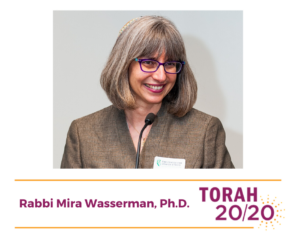A D’var Torah by Rabbi Mira Wasserman, Ph.D. for Parshat Korach
The problem with Korach is that his words sound so righteous.
Korach is a Levite who gathers a group of chieftains and other prominent men of Israel in a rebellion against Moses and Aaron. Korach challenges their leadership, proclaiming “All of the community are holy, all of them, and the Lord is in their midst. Why then do you raise yourself above the Lord’s congregation?” (Num 16:3).
Especially in the midst of our current protests against racism and domination, his words of protest resonate: We too consider the whole community holy. We too challenge hierarchy. It is discomfiting to feel a flash of sympathy for a character that the Torah condemns as a villain.
If we dig a little deeper, we can see that Korach’s rebellion is in fact very unlike the struggle against structural racism and police brutality that moves so many of us today. A tradition from Midrash (Tanchuma Korach 2) exposes just how insidious Korach’s words are.
Sign up to receive Torah 20/20 in your inbox each week.
The midrash conjures a scene in which Korach and Moses are depicted as proto-rabbis, arguing over points of law. Moses upholds the details of divine commandments, while Korach challenges them. The first topic they debate connects to the instruction to add blue threads or tzitzit/fringes to the corners of one’s clothes, the passage that concluded last week’s Torah portion. According to the midrash, Korach hears this commandment and immediately rises to protest:
Korach said to Moses, “In the case of a tallit/prayer shawl that is entirely blue, would one be exempt from the requirement of tzitzit?”
Moses said to him, “[No, even such a tallit] is required to have tzitzit.”
Korach said to him, “Would not a tallit that is all blue exempt itself, when four threads are enough to exempt it?!”
[Korach then went on to issue a second challenge:] “In the case of a house that is full of Torah scrolls, would one be exempt from the requirement of mezuzah?”
[Moses] said to him, “[No, such a house] is still required to have a mezuzah.”
[Korach] said to him, “How is that the whole Torah has two hundred and seventy-five portions and they do not suffice to exempt the house, and yet the two portions that are in the mezuzah do!?”
While at first glance, one might be tempted to see Korach’s challenge as a benign exercise in rabbinic argument, something far more sinister is going on. Not only do Korach’s objections fall outside the realm of legitimate rabbinic argument — no ancient Sage would ever challenge the clear directives of divine commandment — they expose an attitude that denies core Torah teachings.
Find more commentaries on Parshat Korach.
Both of Korach’s challenges have the same structure. Korach rejects the notion that something small — either tzitzit or mezuzah — could be more important than something big. In opposing tzitzit to a blue tallit and mezuzah to a houseful of scrolls, the midrash picks up on Korach’s tactic of putting Moses and Aaron in opposition to “all of the community.” Korach invokes the whole, promoting the general over the specific, the greater over the lesser. He fails to recognize that in Torah, the detailed particulars make all the difference. In the realm of ritual as in the domain of justice, the demands of righteousness are precise.
Korach, as imagined by the midrash, voices the very logic that is encapsulated in the words “all lives matter.” He evades specific demands with an appeal to an abstract “all.” He and his followers might speak on behalf of “all of the community,” but it is their own privileged positions that are their real concern. The midrash highlights the duplicity of invoking the “all” as a weapon against the particular demands of righteousness. How prescient of the midrash to recognize the danger of appealing to universals when specific breaches of justice are at stake. That all lives matter is no doubt true but it is too general to convey much meaning. Black Lives Matter names the challenge we face today with urgency and specificity.
The midrash does more than help us understand what Korach does wrong — it also reminds us of the values that Korach overlooks. Tzitzit and mezuzah have more in common than their smallness; they are both practices that honor what happens at the margins. The edges of one’s clothes and the doorways of one’s house mark the boundaries between the self and the world. These are commandments that train us to look beyond ourselves, priming us to notice other people.
The Torah answers Korach’s empty appeals to generalities with the wisdom we need right now, reminding us that the dictates of holiness are particular and that they require us to look beyond the boundaries of our own experience. To say that Black Lives Matter is but a threshold. The demands of justice, like ritual devotions, are focused and specific. May we attend to the particulars of this moment as our Torah commands.
The demands of justice, like ritual devotions, are focused and specific. May we attend to the particulars of this moment as our Torah commands.
Rabbi Mira Beth Wasserman, Ph.D. is the director of the Center for Jewish Ethics and assistant professor of rabbinic literature and civilization at the Reconstructionist Rabbinical College.

